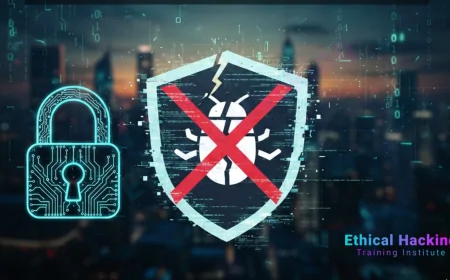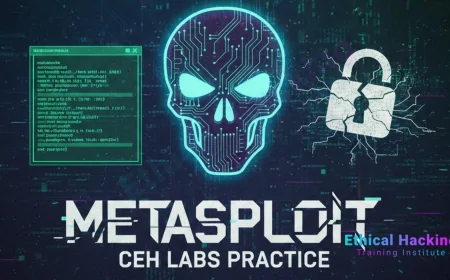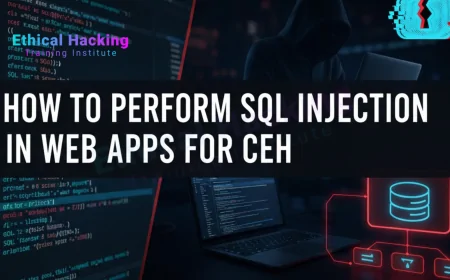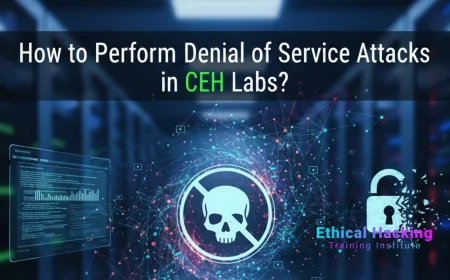Top Career Opportunities After Ethical Hacking Course in Pune | Build Your Cybersecurity Future
Discover the most promising career opportunities after completing an ethical hacking course in Pune. Explore job roles, industry demand, and how ethical hacking training can shape your cybersecurity career in 2025 and beyond.
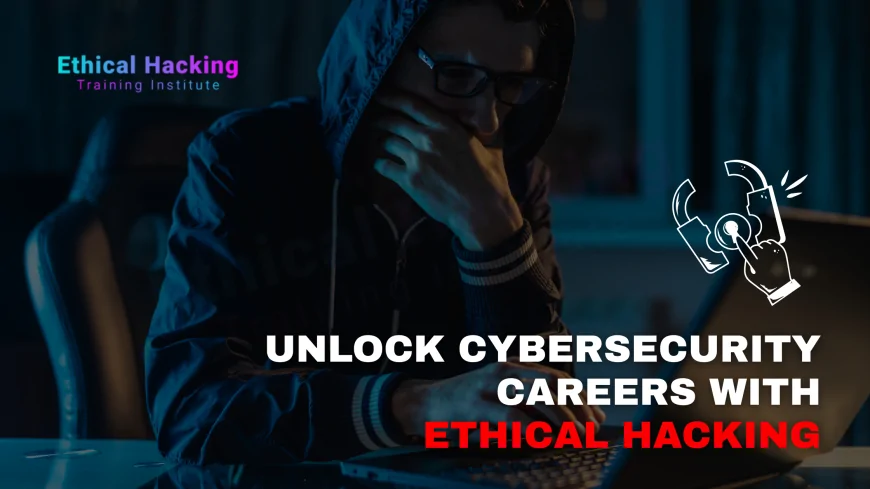
In the digital age, Cybersecurity has become a paramount concern for organizations worldwide. As cyber threats evolve, the demand for skilled professionals who can safeguard digital assets has surged. Ethical hacking, the practice of legally penetrating systems to identify vulnerabilities, has emerged as a critical component in this defense strategy. Pune, a burgeoning IT hub in India, offers a fertile ground for aspiring ethical hackers to cultivate their skills and embark on rewarding careers.
Ethical hacking involves authorized attempts to breach computer systems, networks, or applications to uncover security flaws. Unlike malicious hackers, ethical hackers operate with permission, aiming to strengthen security measures and prevent potential breaches. Their work is instrumental in preempting cyberattacks and ensuring data integrity.
Why Choose Pune for Ethical Hacking?
Pune's rapid growth in the IT sector has positioned it as a hotspot for cybersecurity initiatives. The city's ecosystem offers:
-
Diverse Career Opportunities: A plethora of roles in cybersecurity across various industries.
-
Educational Resources: Access to quality training programs and workshops.
-
Professional Networking: A vibrant community of tech professionals and events.
-
Cost-Effective Living: Affordable lifestyle compared to other metropolitan cities.
Career Opportunities Post Ethical Hacking Course
Completing an ethical hacking course in Pune can open doors to various roles:
1. Penetration Tester
Penetration testers, or "pen testers," simulate cyberattacks to identify vulnerabilities in systems. They employ tools and techniques to assess the robustness of security measures, providing actionable insights to fortify defenses.
2. Security Analyst
Security analysts monitor networks for suspicious activities, analyze security breaches, and implement protective measures. Their role is pivotal in maintaining an organization's cybersecurity posture.
3. Network Security Engineer
These professionals design and implement secure network solutions, ensuring data transmission integrity and safeguarding against unauthorized access.
4. Cybersecurity Consultant
Consultants advise organizations on best practices, conduct security assessments, and develop strategies to mitigate risks. Their expertise helps businesses navigate the complex cybersecurity landscape.
5. Incident Responder
Incident responders act swiftly during security breaches, containing threats, analyzing incidents, and restoring normal operations. Their rapid response minimizes damage and facilitates recovery.
6. Security Auditor
Security auditors evaluate an organization's security policies and procedures, ensuring compliance with standards and identifying areas for improvement.
7. Bug Bounty Hunter
Freelance ethical hackers who identify and report vulnerabilities in software or systems, often receiving monetary rewards from organizations for their findings.
8. Forensic Analyst
Forensic analysts investigate cybercrimes, collecting and analyzing digital evidence to understand breaches and support legal proceedings.
Industry Demand and Salary Prospects
The cybersecurity field is experiencing exponential growth. According to industry reports, India alone is expected to require over 1 million cybersecurity professionals by 2025. Salaries in this domain are competitive:
-
Entry-Level Positions: ₹3.5 to ₹5 LPA
-
Mid-Level Roles: ₹6 to ₹10 LPA
-
Senior Positions: ₹12 LPA and above
These figures can vary based on certifications, experience, and the specific role.
Certifications Enhancing Career Prospects
Obtaining industry-recognized certifications can significantly boost employability:
-
Certified Ethical Hacker (CEH): Validates skills in ethical hacking methodologies.
-
CompTIA Security+: Covers foundational cybersecurity concepts.
-
Offensive Security Certified Professional (OSCP): Focuses on advanced penetration testing techniques.
-
Certified Information Systems Security Professional (CISSP): Demonstrates expertise in designing and managing security programs.
Skills Acquired Through Ethical Hacking Courses
Ethical hacking courses equip learners with a diverse skill set:
-
Network and System Security: Understanding protocols, configurations, and defense mechanisms.
-
Vulnerability Assessment: Identifying and mitigating security weaknesses.
-
Cryptography: Implementing encryption techniques to protect data.
-
Malware Analysis: Studying malicious software to understand its behavior and impact.
-
Security Tools Proficiency: Hands-on experience with tools like Nmap, Wireshark, and Metasploit.
The Future of Ethical Hacking Careers
As technology continues to evolve, the scope for ethical hackers expands:
-
IoT Security: Securing interconnected devices in smart homes and industries.
-
Cloud Security: Protecting data and applications in cloud environments.
-
AI and Machine Learning Security: Addressing vulnerabilities in intelligent systems.
-
Blockchain Security: Ensuring the integrity of decentralized applications and transactions.
FAQ's
1. What jobs can I get after completing an ethical hacking course in Pune?
After completing an ethical hacking course in Pune, you can apply for roles like penetration tester, security analyst, SOC analyst, vulnerability assessor, and cybersecurity consultant. The training typically equips you with hands-on experience, making you job-ready for both domestic and international opportunities.
2. Is ethical hacking a good career option after completing a course in Pune?
Yes, ethical hacking is a highly rewarding and in-demand career. After completing a course in Pune, you can enter fields such as cybersecurity, threat detection, or forensic analysis, with excellent salary growth and long-term prospects in both government and private sectors.
3. Do ethical hacking institutes in Pune provide job placement assistance?
Most ethical hacking training institutes in Pune offer 100% placement assistance, resume-building help, and interview preparation sessions. These institutes often have tie-ups with tech firms, cybersecurity consultancies, and startups to support student employment post-certification.
4. What salary can I expect after completing an ethical hacking course in Pune?
Entry-level salaries after an ethical hacking course in Pune typically range from ₹3.5 LPA to ₹6 LPA, depending on your background and the company. With 2–3 years of experience, your income can rise significantly due to the growing demand for cybersecurity professionals.
5. What are the international career prospects after learning ethical hacking in Pune?
Once certified in ethical hacking, you can explore global opportunities in countries like the US, UK, Canada, and UAE, especially if you also hold certifications like CEH or CompTIA Security+. Pune’s training environment aligns well with international job requirements.
6. Are internships available after ethical hacking training in Pune?
Yes, many ethical hacking institutes in Pune offer internship opportunities with cybersecurity firms or in-house labs. These internships help you gain real-world experience, build your portfolio, and boost employability after course completion.
7. What industries hire ethical hackers after completing training in Pune?
Industries such as IT services, banking, finance, healthcare, telecom, and government actively hire ethical hackers. Pune’s growing IT ecosystem makes it easier to connect with diverse industries that require cybersecurity professionals.
8. Can I become a freelance ethical hacker after training in Pune?
Yes, you can pursue freelancing or bug bounty programs after completing ethical hacking training. Many professionals earn a substantial income by identifying security vulnerabilities for global companies, all while working remotely.
9. Are government jobs available after completing ethical hacking in Pune?
Absolutely. You can apply for cybercrime cells, digital forensics roles, and defense cybersecurity departments. A recognized ethical hacking certification from Pune gives you a solid foundation for government cybersecurity roles.
10. How soon can I get a job after completing ethical hacking training in Pune?
Many students secure jobs within 2–3 months of completing their course, especially when they’ve participated in internships, live projects, and mock interviews offered by the training institute.
11. Can ethical hacking training in Pune help me shift careers from another domain?
Yes, ethical hacking is a great choice for career switchers, especially those from IT, networking, or software backgrounds. Institutes in Pune often design beginner-friendly curriculums to help professionals shift smoothly into cybersecurity.
12. What skills are most in demand after ethical hacking training?
Post-training, employers look for skills in penetration testing, vulnerability scanning, network security, malware analysis, and knowledge of tools like Metasploit, Wireshark, and Nmap. Pune’s institutes focus heavily on practical tool usage to meet these demands.
13. Are CEH or other certifications necessary after completing a course in Pune?
While not always mandatory, having certifications like CEH (Certified Ethical Hacker) or CompTIA Security+ boosts your credibility and job opportunities. Many institutes in Pune also prepare you for these international certifications.
14. Do Pune-based ethical hacking courses cover resume and interview training?
Yes, reputed institutes include career grooming modules, mock interviews, and resume writing workshops to prepare students for the job market. These sessions improve your communication, confidence, and technical articulation during interviews.
15. How important is hands-on experience for career opportunities in ethical hacking?
Hands-on labs and live projects are critical for securing jobs. Employers value candidates who can demonstrate real-world problem-solving skills. Institutes in Pune often include lab-based learning environments and cyber ranges for practical experience.
16. Can students from non-technical backgrounds get jobs after ethical hacking training?
Yes, while a technical background helps, non-tech students can also build strong careers with the right guidance. Many Pune institutes offer foundation modules in networking and operating systems to help such students transition effectively.
17. What roles are available for ethical hackers in startups?
Startups often hire ethical hackers for roles like app security testers, DevSecOps engineers, and system security analysts. Pune’s vibrant startup ecosystem increases your chances of finding diverse, hands-on roles after training.
18. Is there scope for career growth in ethical hacking after entry-level jobs?
Absolutely. Ethical hacking offers a defined growth path to senior analyst, cybersecurity architect, red team lead, or CISO. Continued learning, certifications, and experience can fast-track your career in Pune or globally.
19. How can I stay updated in my career after completing the ethical hacking course?
To stay relevant, engage in continuous learning through online certifications, cybersecurity news portals, threat intelligence reports, and hackathons. Pune’s tech community also hosts cybersecurity meetups and workshops to help professionals grow.
20. Will an ethical hacking course help me build a career abroad?
Yes, if you combine your course with global certifications and practical experience, many foreign companies will consider you for remote or onsite roles. Pune’s training prepares students for international job interviews and cyber laws awareness.
Key Takeaways
Embarking on a career in ethical hacking in pune offers a promising trajectory filled with diverse opportunities. The city's dynamic IT landscape, coupled with the growing emphasis on cybersecurity, creates an ideal environment for aspiring professionals. By acquiring the right skills, certifications, and practical experience, individuals can position themselves at the forefront of this critical field, contributing to the safety and security of digital infrastructures.
What's Your Reaction?
 Like
0
Like
0
 Dislike
0
Dislike
0
 Love
0
Love
0
 Funny
0
Funny
0
 Angry
0
Angry
0
 Sad
0
Sad
0
 Wow
0
Wow
0
